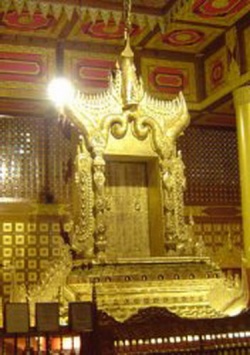Difference between revisions of "Seven kinds of treasures"
(Created page with "thumb|250px| <poem> '''seven kinds of treasures''' (1) [七宝] (Jpn shichi-ho or shippo ) Also, seven treasures or seven kinds of gems.Precious s...") |
|||
| Line 4: | Line 4: | ||
[七宝] (Jpn shichi-ho or shippo ) | [七宝] (Jpn shichi-ho or shippo ) | ||
| − | Also, seven treasures or seven kinds of gems.Precious substances mentioned in the sutras.The list differs among the Buddhist scriptures.According to the Lotus Sutra, the seven are: gold, | + | Also, [[seven treasures]] or [[seven kinds of gems]]. Precious substances mentioned in the [[sutras]]. The list differs among the [[Buddhist scriptures]]. According to the [[Lotus Sutra]], the seven are: |
| − | silver, | + | {{Wiki|gold}}, |
| − | lapis lazuli, | + | {{Wiki|silver}}, |
| − | seashell, | + | {{Wiki|lapis lazuli}}, |
| − | agate, | + | {{Wiki|seashell}}, |
| − | pearl, | + | {{Wiki|agate}}, |
| − | + | {{Wiki|pearl}}, and | |
| + | {{Wiki|carnelian}}. | ||
| − | In the "Treasure Tower" (eleventh) chapter of the sutra, the treasure tower adorned with these seven kinds of treasures appears from beneath the earth.In a letter known as On the Treasure Tower, Nichiren associates the seven kinds of treasures that adorn the treasure tower with the seven elements of practice, writing: "It is the treasure tower adorned with the seven kinds of | + | In the "[[Treasure]] Tower" (eleventh) chapter of the [[sutra]], the treasure tower adorned with these [[seven kinds of treasures]] appears from beneath the [[earth]]. In a letter known as On the [[Treasure]] Tower, [[Nichiren]] associates the [[seven kinds of treasures]] that adorn the [[treasure]] tower with the seven elements of practice, writing: "It is the [[treasure]] tower adorned with the [[seven kinds of treasures]]—hearing the correct teaching, believing it, keeping the precepts, engaging in [[meditation]], practicing assiduously, renouncing one's [[attachments]], and reflecting on oneself" (299). |
| − | (2)[七財・七聖財](Jpn shichi-zai or shichi-shozai ): Seven indispensable elements of Buddhist practice, which are compared to treasures. They are hearing the correct teaching, believing it, keeping the precepts, engaging in meditation, practicing assiduously, renouncing one's attachments, and reflecting on oneself. | + | (2)[七財・七聖財](Jpn shichi-zai or shichi-shozai ): Seven indispensable elements of [[Buddhist]] practice, which are compared to [[treasures]]. They are hearing the correct teaching, believing it, keeping the [[precepts]], engaging in [[meditation]], practicing {{Wiki|assiduously}}, renouncing one's [[attachments]], and {{Wiki|reflecting}} on oneself. |
</poem> | </poem> | ||
{{R}} | {{R}} | ||
Revision as of 19:38, 10 August 2013
seven kinds of treasures (1)
[七宝] (Jpn shichi-ho or shippo )
Also, seven treasures or seven kinds of gems. Precious substances mentioned in the sutras. The list differs among the Buddhist scriptures. According to the Lotus Sutra, the seven are:
gold,
silver,
lapis lazuli,
seashell,
agate,
pearl, and
carnelian.
In the "Treasure Tower" (eleventh) chapter of the sutra, the treasure tower adorned with these seven kinds of treasures appears from beneath the earth. In a letter known as On the Treasure Tower, Nichiren associates the seven kinds of treasures that adorn the treasure tower with the seven elements of practice, writing: "It is the treasure tower adorned with the seven kinds of treasures—hearing the correct teaching, believing it, keeping the precepts, engaging in meditation, practicing assiduously, renouncing one's attachments, and reflecting on oneself" (299).
(2)[七財・七聖財](Jpn shichi-zai or shichi-shozai ): Seven indispensable elements of Buddhist practice, which are compared to treasures. They are hearing the correct teaching, believing it, keeping the precepts, engaging in meditation, practicing assiduously, renouncing one's attachments, and reflecting on oneself.
